Article contents
On Homer's Winged Words
Published online by Cambridge University Press: 11 February 2009
Extract
In Virgil, as in modern narrative, the act of saying is barely mentioned or left out altogether. At times the transition from indirect to direct speech comes abruptly, without warning (Aen. 2. 657 ff., 675 ff., 10. 825 ff.). On the other hand, the stress falls on the speaker's position within the general narrative. We are thus drawn away from the actuality of speech to a broader frame of reference. The characters seem to be more concerned with the distant implications of the action than with the present moment. Their motivations and fortunes cover the years. They merge, therefore, into legend, history, romance; and the words they speak illustrate their extending roles.
- Type
- Research Article
- Information
- Copyright
- Copyright © The Classical Association 1975
References
page 1 note 1 On these, see Fournier, H., ‘Formules homériques de référence avec verbe "dire"’, Revue de Philologie xx (1946), 29–68;Google Scholar Edwards, Mark W., ‘Homeric Speech Introductions’, H.S.C.P. lxxiv (1970), 1–36.Google Scholar
Fournier stresses the influence of metre to the detriment of meaning, Edwards shows how ‘formulaic economy’ yields to variations of expression. Both these scholars are thus chiefly concerned with the range of ‘formulaic’ diction—the former to affirm its overriding importance, the latter to point out its limitations. Though they provide useful claasifications, neither of them dwells on the characteristic value of the words themselves.
page 1 note 2 Except Il 23.855, where see Leaf's note.
page 2 note 1 The prevailing view is that the phrase is a metaphor from the flight of birds or, with less taste, from archery: see Stanford, W. B., Greek Metaphor (Oxford, 1936), 136–7. The ancients, on the other hand, took  simply as ‘swift’. See Ebeling, ad v.Google Scholar
simply as ‘swift’. See Ebeling, ad v.Google Scholar
I think that  is no more a metaphor than, say,
is no more a metaphor than, say,  . What we consider an abstract entity is for Homer a concrete self-existing thing, and it does not need figurative treatment.
. What we consider an abstract entity is for Homer a concrete self-existing thing, and it does not need figurative treatment.
page 3 note 1 For other interpretations of this phrase, see W. B. Stanford's commentary on Od. 17. 57 (The Odyssey of Homer [Macmillan, 1967], ii. 282–3);Google Scholar Combellack, Frederick, ‘Words that die’, Classical Journal xlvi (1950), 25 n. 7.Google Scholar
page 4 note 1 George M. Calhoun, ‘The Art of formula in Homer— ’, Classical Philology xxx (1935), 215–27.
’, Classical Philology xxx (1935), 215–27.
Calhoun's interpretation is based on contents. He quotes the passages in which the phrase recurs, trying to show that they always imply or indicate emotion. He notes (p. 223) ‘how this supposedly colorless tag is associated with emotional reactions or with tense situations, and how completely it covers the whole range of human feeling, from mild amusement and quiet satisfaction to hot anger and desperate fear’.
We may object, of course, that there is hardly a passage in the poems that does not denote some tension, and that speech in the most impassioned dialogues (that between Agamemnon and Achilles, for instance, or between Hector and Andromache) is not usually introduced by this phrase. Moreover Homer has more appropriate forms of expression to introduce a particular tone: cf. 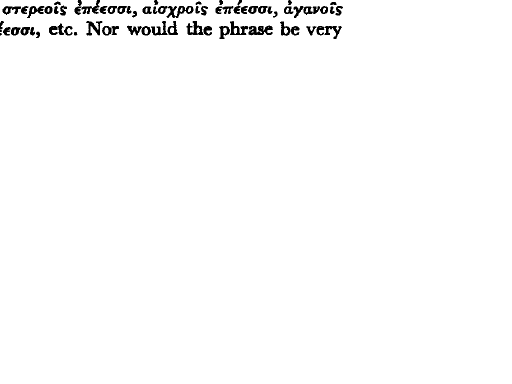 , etc. Nor would the phrase be very significant if Calhoun's argument were true. We should have to suppose that ‘winged words’ underline emotion in any given instance. The phrase would again become a ‘tag’—not for the purpose of versification in this case, but to earmark a meaning which is otherwise expressed; for the word
, etc. Nor would the phrase be very significant if Calhoun's argument were true. We should have to suppose that ‘winged words’ underline emotion in any given instance. The phrase would again become a ‘tag’—not for the purpose of versification in this case, but to earmark a meaning which is otherwise expressed; for the word  does not itself indicate emotion.
does not itself indicate emotion.
What Calhoun takes into account is a purely narrative value. He writes: ‘In examining the passages in which the formula is found, I shall treat separately the instances which refer to the principal characters.’ Accordingly he illustrates Odysseus' emotions in some fifteen instances. Eumaeus' winged words in Od. 17. 349, 552 he attributes to the affection which Eumaeus has previously conceived for Odysseus. Similarly he notes that Achilles speaks winged words more than anyone else in the Iliad and proceeds to describe the hero's range of emotion in this connection. It is as if the phrase had the function of descriptively bringing out certain characters or following up trends of feeling that run through the plot.
This is to miss, I think, something that is deeply characteristic of Homer: the rendering of acts in their own right. These are presented in full physical evidence—feet that move, eyes that see, a hand that clasps, a heart that stirs. In each case the act is seen in the nature of its realization, and its connection with the context is existential rather than narrative. It is no different with the act of speaking. Such a phrase as 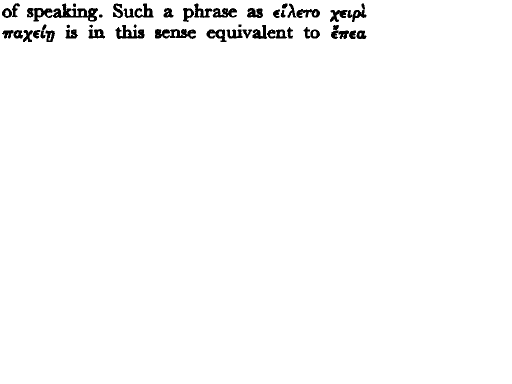 is in this sense equivalent to
is in this sense equivalent to  . Pressure is as distinctive of touch as flight is of speech. Words are winged on the strength of their own nature, and not because they serve some alleged purpose. They fly out when the situation allows it, when there is an opening in the action or a moment of release, and not for any definite purpose. It is arbitrary to encroach on the natural truth of the image, as Calhoun does when for the sake of his thesis he strains the meaning of
. Pressure is as distinctive of touch as flight is of speech. Words are winged on the strength of their own nature, and not because they serve some alleged purpose. They fly out when the situation allows it, when there is an opening in the action or a moment of release, and not for any definite purpose. It is arbitrary to encroach on the natural truth of the image, as Calhoun does when for the sake of his thesis he strains the meaning of  into ‘quickly spoken’, ‘animated’. He thus defeats his own deeper purpose. The phrase loses its poetic quality by being so narrowed down.
into ‘quickly spoken’, ‘animated’. He thus defeats his own deeper purpose. The phrase loses its poetic quality by being so narrowed down.
page 4 note 2 Parry, Milman, ‘About Winged Words’, Classical Philology xxxii (1937), 59–63;CrossRefGoogle Scholar now The Making of Homeric Verse (Oxford, 1971), 414–18.Google Scholar
Parry's explanation is simply based on grammar and metre. Since the sentence ‘spoke winged words’ always recurs without the proper name as subject, Parry believes that it is used to introduce a speech ‘when the character who is to speak has been the subject of the last verses, so that the use of his name in the line would be clumsy’. Pointing out that Od. 1. 122, for instance, requires not ‘and Telemachus said’ but ‘and he said’, Parry argues that the poet had no other way of expressing the meaning ‘and he said’ in a whole hexameter line.
This is surely begging the question. What has to be explained is the very fact which is adduced as a proof: viz., that Telemachus, after performing other acts, speaks winged words. For the phrase ‘winged words’ is not at all indispensable in such a case. Homer did not need a whole line for the meaning ‘he said’. He could very well have let Telemachus do what he does down to the last line preceding his speech, simply joining a verb of ‘saying’. This is quite normal in Homer, cf. Il. 12–16, 333, 440–1, 5. 799, 7. 190, etc. See also M. W. Edwards, op. cit. 10–12. In the instance adduced by Parry there were, doubtless, many other ways is which Telemachus' acts could have beer brought to a close before he spoke. Any appropriate detail could have come to the poet's mind. We could have had, for instance: 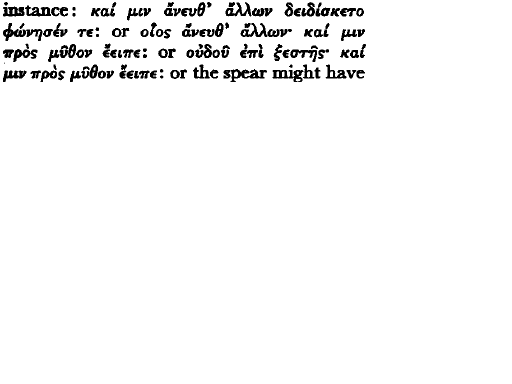 : or the spear might have been qualified (cf. 100):
: or the spear might have been qualified (cf. 100): 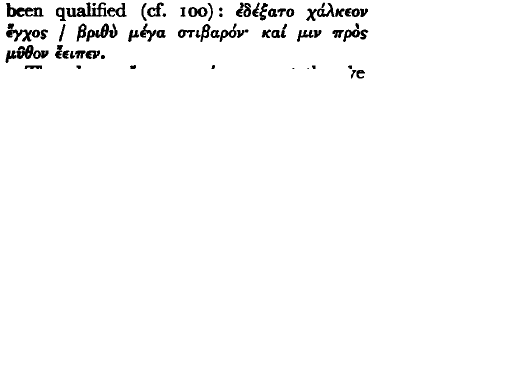 .
.
The phrase  must thus be explained on its own merits. The fact that no proper name recurs as its subject in the same line is but a necessary detail of syntax and metre, it is a result and not a cause. It cannot be used to explain the value of the words. Rather the question should be put thus: why is it that the moment of the utterance should be so emphasized as tc occupy a whole line? In order to answer, we have to account for the movement of the whole passage—how it leads to the clirnal of ‘winged words’. Parry, on the other hand argues that Homer could not plan hi: syntax so far ahead. He writes: ‘This wouk be a very complex sort of verse-making anc quite foreign to the way in which suet traditional and oral song as that of Homer is composed. The singer of oral narrative rarely plans his sentences ahead …’ Parry thus denies Homer a talent of expression which we enjoy even in ordinary conversation—as when, for instance, we describe a friend who on some occasion said or did something remarkable, and we so turn our description as to fit that occasion. Here is a spontaneity which Parry seems to ignore. It is neither a question of ‘planning ahead’ nor of composing from instant to instant through an acquired instinct. Thought prefigures its outcome even at the moment it comes to mind—something of which anyone may be aware in a creative mood.
must thus be explained on its own merits. The fact that no proper name recurs as its subject in the same line is but a necessary detail of syntax and metre, it is a result and not a cause. It cannot be used to explain the value of the words. Rather the question should be put thus: why is it that the moment of the utterance should be so emphasized as tc occupy a whole line? In order to answer, we have to account for the movement of the whole passage—how it leads to the clirnal of ‘winged words’. Parry, on the other hand argues that Homer could not plan hi: syntax so far ahead. He writes: ‘This wouk be a very complex sort of verse-making anc quite foreign to the way in which suet traditional and oral song as that of Homer is composed. The singer of oral narrative rarely plans his sentences ahead …’ Parry thus denies Homer a talent of expression which we enjoy even in ordinary conversation—as when, for instance, we describe a friend who on some occasion said or did something remarkable, and we so turn our description as to fit that occasion. Here is a spontaneity which Parry seems to ignore. It is neither a question of ‘planning ahead’ nor of composing from instant to instant through an acquired instinct. Thought prefigures its outcome even at the moment it comes to mind—something of which anyone may be aware in a creative mood.
It may be objected, however, that my argument is subjective and does not amount to any proof. If this be so, let us look at the phrase itself. Consider these points: (I) The phrase is never used merely to introduce a speech, though such a verse as 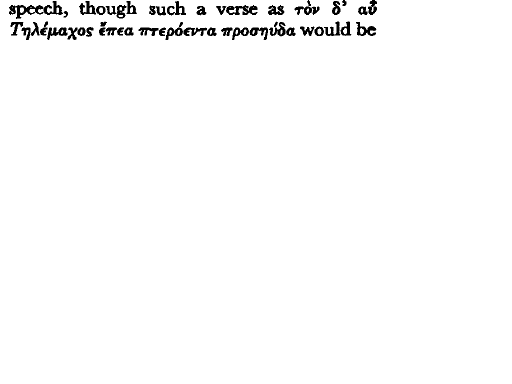 would be metrically correct. (2) It hardly ever introduces a mere reply in the form
would be metrically correct. (2) It hardly ever introduces a mere reply in the form 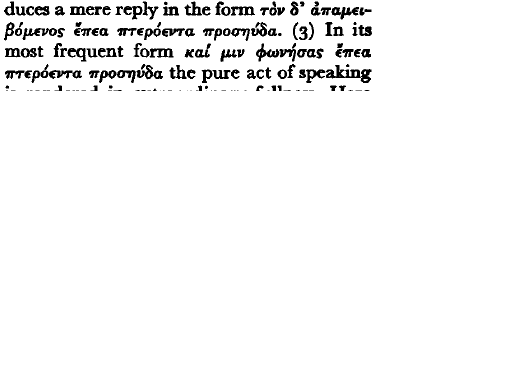 (3) In its most frequent form the pure act of speaking is rendered in extraordinary fullness. Here are sure signs of expressive value. This should give us pause before we elevate Parry's notion of facility in the composition to an aesthetic principle.
(3) In its most frequent form the pure act of speaking is rendered in extraordinary fullness. Here are sure signs of expressive value. This should give us pause before we elevate Parry's notion of facility in the composition to an aesthetic principle.
page 7 note 1  has been strangely inter preted as equivalent, or similar, to
has been strangely inter preted as equivalent, or similar, to  ‘desire of crying’. So Faesi, Merry and Riddell, Stanford. Surely such a use of the adjective is quite unhomeric. Nor does such a meaning make any sense in this passage. We should let
‘desire of crying’. So Faesi, Merry and Riddell, Stanford. Surely such a use of the adjective is quite unhomeric. Nor does such a meaning make any sense in this passage. We should let  mean as usual ‘lovely’ ‘sweet’, and we should accept the originality of the Homeric sentence in its obvious sense. I take
mean as usual ‘lovely’ ‘sweet’, and we should accept the originality of the Homeric sentence in its obvious sense. I take  as ‘emerged from within’, cf. Od. 6. 127, 20. 53. We could then take
as ‘emerged from within’, cf. Od. 6. 127, 20. 53. We could then take 
 as a dative of ‘interest’, cf. Il. 1. 59
as a dative of ‘interest’, cf. Il. 1. 59
page 8 note 1 We have 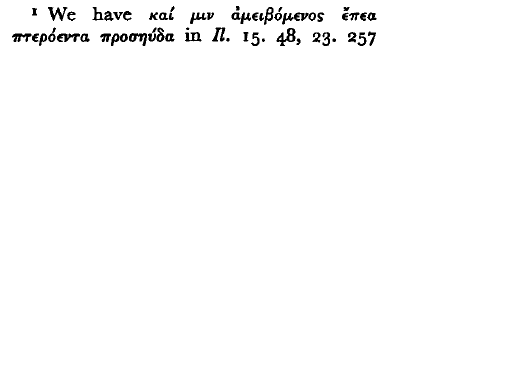 in Il. 15. 48, 23. 257 where
in Il. 15. 48, 23. 257 where  etc. would have been more like Homer; in Il. 7. 356
etc. would have been more like Homer; in Il. 7. 356 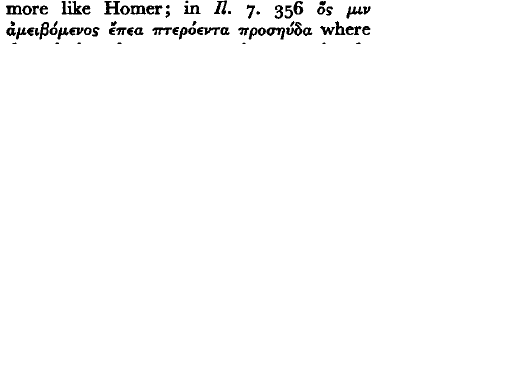 where the relative phrase seems quite exceptional; in Od. 9. 409
where the relative phrase seems quite exceptional; in Od. 9. 409 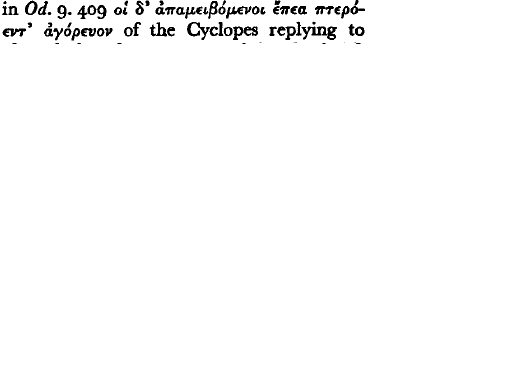 of the Cyclopes replying to Polyphemus. It is remarkable that this usage is so rare, considering the many possible occasions.
of the Cyclopes replying to Polyphemus. It is remarkable that this usage is so rare, considering the many possible occasions.
page 9 note 1 In more than one third of the instances we have  which I would translate ‘and breaking into voice he (or she) spoke winged words.’ We have the pure emission ol sound and the articulation into words. The moment of the utterance is thus given full evidence. Cf. Classen, J., Beobachtungen übel den Homerisdien Sprachgebrauch (Frankfurt 1879), 115–20.Google Scholar
which I would translate ‘and breaking into voice he (or she) spoke winged words.’ We have the pure emission ol sound and the articulation into words. The moment of the utterance is thus given full evidence. Cf. Classen, J., Beobachtungen übel den Homerisdien Sprachgebrauch (Frankfurt 1879), 115–20.Google Scholar
We might suppose that this was the origi. nal form of the expression, or at least the one that best renders the Homeric stress on the act itself. Elsewhere we find it modified tc suit the context: 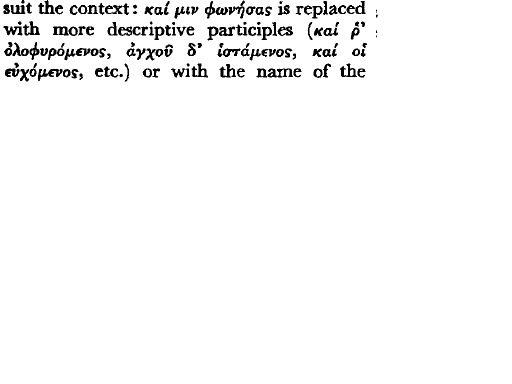 is replaced with more descriptive participles (
is replaced with more descriptive participles (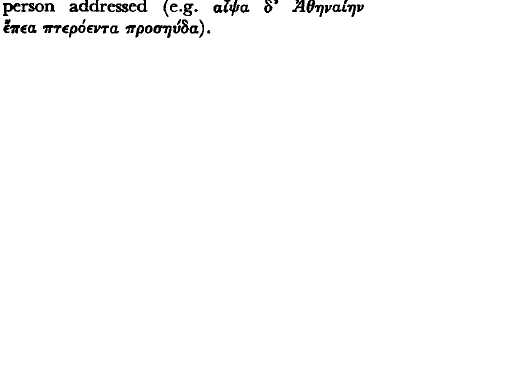 , etc.) or with the name of the person addressed (e.g.).
, etc.) or with the name of the person addressed (e.g.).
It stands to reason that, through it extensive use, the phrase tends to lose its original value. Thus it seems to lack all poignancy in the mock-heroic battles of the gods—Il. 21. 409, 479, 427, cf. 5. 871. In Il. 15. 145 of Hera who merely repeats an order of Zeus. So Il. 4. 203. We may also note that the whole line 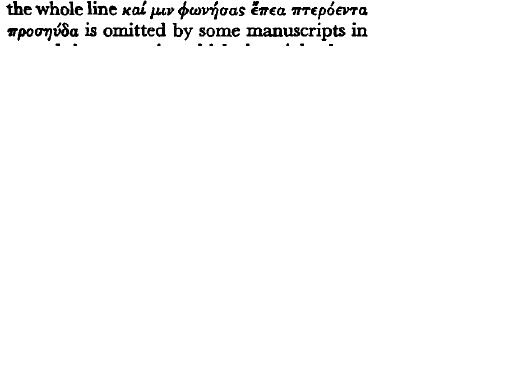 is omitted by some manuscripts in several instances in which it might have seemed superfluous: Il. 4. 369, 10. 191, 17. 219, 21. 73, Od. 10. 265, 430, 482. We also find
is omitted by some manuscripts in several instances in which it might have seemed superfluous: Il. 4. 369, 10. 191, 17. 219, 21. 73, Od. 10. 265, 430, 482. We also find 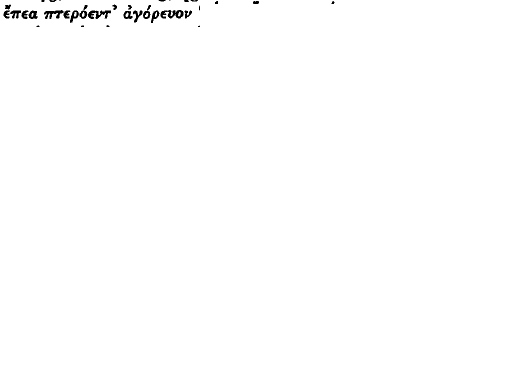 ‘they conversed’ without introducing a speech in Il. 24. 142, Od. 13. 165.
‘they conversed’ without introducing a speech in Il. 24. 142, Od. 13. 165.
page 9 note 2 The traditional explanation ‘said and called by name’, a hysteron proteron, cannot be right. It makes the meaning very flat. Besides, the proper name very often does not recur in the speech that follows, and, conversely, there are in the poems countless addresses which have the vocative of the person addressed and are not introduced by this phrase. In Od. 21. 248 we even find the phrase introducing a soliloquy, cf. 7. 330. On the contrary, we have a climax: first the simple utterance (‘spoke word’) and then speech made more specific, pressing, personal (‘named’). We may understand 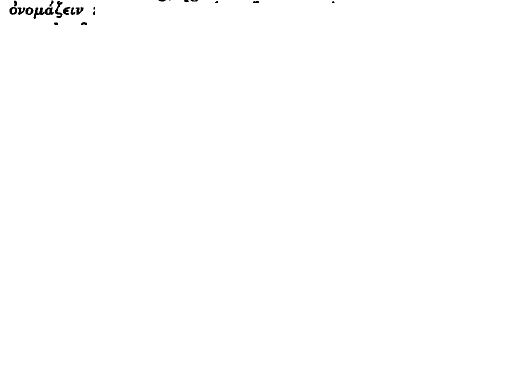 as ‘naming things by their right name’, cf. Il. 9. 515, 18. 449, Od. 24. 339.
as ‘naming things by their right name’, cf. Il. 9. 515, 18. 449, Od. 24. 339.
See H. Jacobsohn, ‘Zum homerischen 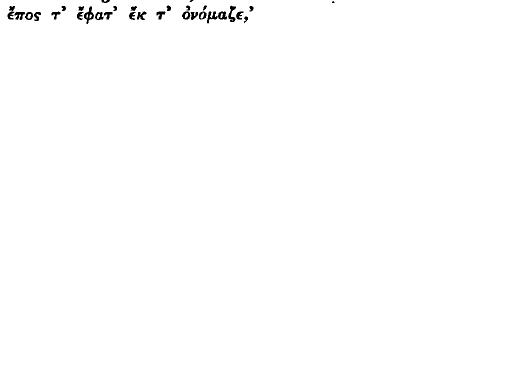 Zeitschnft für vergleichende Sprachforschung lxii (1935), 132–40.Google Scholar He rules out any hysteron proteron, denying that
Zeitschnft für vergleichende Sprachforschung lxii (1935), 132–40.Google Scholar He rules out any hysteron proteron, denying that  could mean ‘called by name’ on the ground that this would require an aorist. He also excludes, however, the meaning ‘put into words’. Cf. Mutzbauer, C., Die Grundlage der griechischen Tempuslehre and der Homerische Tempusgebrauch (Strassburg, 1909), ii. 113.Google Scholar
could mean ‘called by name’ on the ground that this would require an aorist. He also excludes, however, the meaning ‘put into words’. Cf. Mutzbauer, C., Die Grundlage der griechischen Tempuslehre and der Homerische Tempusgebrauch (Strassburg, 1909), ii. 113.Google Scholar
page 11 note 1 See Chantraine, P., La Formation des norm en grec ancien (Paris, 1933), 97,Google Scholar 113, 361; Fournier, H, Les Verbes ‘dire’ en grec ancien (Paris, 1946), 227–9.Google Scholar
page 12 note 1 Thus in the Homeric phrase 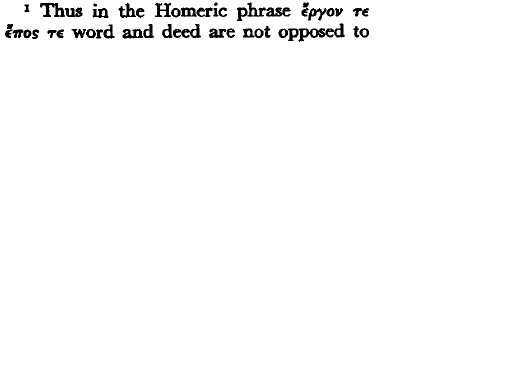 word and deed are not opposed to each other but form a kind of hendiadys expressing one sole idea: Il. 15. 234, Od. 11 346; cf. Il. 1. 77, 108, 19. 242, Od. 2. 272, 3. 99, 4. 163, 15. 375. We may compare the phrase
word and deed are not opposed to each other but form a kind of hendiadys expressing one sole idea: Il. 15. 234, Od. 11 346; cf. Il. 1. 77, 108, 19. 242, Od. 2. 272, 3. 99, 4. 163, 15. 375. We may compare the phrase  ‘to bring about a word’, that is ‘to perform an action which has been mentioned’: Il. 14. 44, 23. 544; cf. Od. 3. 99, 226, 4. 776–7, Il. 348, 15. 536, 20. 236, Il. 22. 454 and Leaf's note. The only examples to the contrary which I can find are Il. 16. 630, 4. 400, 18. 106, and they are only the barest hint.
‘to bring about a word’, that is ‘to perform an action which has been mentioned’: Il. 14. 44, 23. 544; cf. Od. 3. 99, 226, 4. 776–7, Il. 348, 15. 536, 20. 236, Il. 22. 454 and Leaf's note. The only examples to the contrary which I can find are Il. 16. 630, 4. 400, 18. 106, and they are only the barest hint.
- 5
- Cited by


